
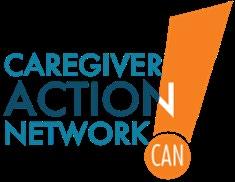
EXECUTIVE SEARCH E x ceptional THIS IS A RETAINED SEARCH OF www.caregiveraction.org April 2023 Chief Executive Officer Caregiver Action Network Washington, DC Position Overview
Introduction
Caregiver Action Network (CAN), the nation’s leading resource and advocate for millions of family caregivers, seeks a strategic, visionary and entrepreneurial chief executive officer (CEO) to drive advancement of its mission, strengthen its constituency engagement, and inspire and guide a team of dedicated staff committed to caring for those who care for others.
For 30 years, CAN and its predecessor organization, have advanced a mission that envisions an America in which family caregivers feel supported and not alone; and are better able to balance the demands of caring with their other responsibilities,
Mission
Promote resourcefulness and respect for the more than 90 million family caregivers across the country.
access needed resources, understand their finances, and ultimately make better, informed decisions about their loved ones’ care. CAN is uniquely positioned to reach millions of family caregivers and serve as a voice for caregivers on the national stage.
Goals
• Create Resourceful Caregivers. Serve an increasing number of family caregivers with practical help, support and information.
• Reduce Caregiver Stress. Improve the quality of life for family caregivers by reducing their day-to-day stress and financial distress.
• Create Respect for Family Caregivers. Advance the case for family caregiver recognition and support.
• Create Capable Caregivers. Build family caregiver confidence and capability through the dissemination of educational programs that demonstrate a positive impact on the lives of family caregivers.
Page 2
An Organization Built on Shared Experience
The roots of Caregiver Action Network extend back to 1991 when friends Suzanne Mintz, who was caring for her husband with multiple sclerosis, and Cindy Fowler, who was caring for her mother with Parkinson’s disease, discovered they were facing similar challenges. Realizing there must be others in the same situation, they founded the National Family Caregivers Association (NFCA) in 1993.
NFCA focused on raising awareness about the existence of family caregivers as a specific cohort within the population, as well as helping family caregivers recognize the importance of their roles. It also provided family caregivers with critical education, resource support, and “a voice,” enabling them to speak up and reach out for help when needed.
Mintz served as NFCA’s President and CEO from 1993 to 2012, during which time the organization drove major advances in family caregiving—from raising public awareness

of critical issues, to developing a nationally accepted nomenclature, to improving communication between caregivers and health services providers. Working regularly with media across the nation, Congress, government agencies, and service organizations, NFCA emerged as the expert source for information on family caregivers.
As a trailblazer, NFCA’s advocacy resulted in many government agencies and health/research organizations (e.g., U.S. Department of Aging, American Heart Association, Alzheimer’s Association) changing caregiving concepts, such as “family caregiver” (instead of “informal caregiver”) and “lifespan caring.” Lifespan caregiving goes beyond adults caring for aging parents to the wider range of caregiving situations, such as children/ youth caring for older family members, parents caring for disabled children, or people caring for wounded-veteran family members.
Page 3
Receiving an initial “Project of National Significance” grant from the U.S. Department of Aging, NFCA went on to train thousands of family caregivers on ways to better communicate with health providers. In 2014, working with Weber Shandwick and the Centers for Medicare and Medicaid Services, CAN inaugurated the Advancing Excellence: Best Practices in Patient and Family Engagement Recognition Program. This initiative continues to spotlight excellence in family caregiving, providing both family caregivers and health care professionals crucial insight and data on techniques that fully integrate the family caregiver and recipient of care into the health care experience.
Additional Points of Pride in the Earlier Years
• Successful Advocacy of National Family Caregivers Support Program (NFCSP). Established in 2000 and managed by the Administration for Community Living (ACL), the NFCSP provides grants to states and territories to fund a range of supports that help family caregivers keep their loved ones at home for as long as possible.
• Launch of National Family Caregiver Recognition. In 1994, NFCA began promoting the celebration of family caregivers during the week of Thanksgiving. President Clinton signed the first Presidential Proclamation in 1997 and every president since has issued an annual proclamation appreciating family caregivers. As interest in family caregiving issues has grown, the celebration has expanded throughout the entire month of November.
• Establishment of a National Volunteer Network. In 1999, NFCA started a national peer-to-peer volunteer network to combat isolation and increase awareness of resources among family caregivers.

Page 4
Scaling for Growth
In 2012, following the retirement of Suzanne Mintz, a new CEO was recruited to take CAN to the next level of success. Known in DC healthcare policy circles for his deep advocacy expertise, John Schall took the reins, ushering in a comprehensive rebranding effort and enhancing communications and education initiatives. A highly effective and inclusive leader, Schall expanded the team, scaling resources and services for caregivers.
In late 2022, following a decade of numerous achievements in advocacy, education, relationship management, and fund development, Schall announced his retirement. Sadly, he succumbed to a recurring illness and passed away, leaving a tremendous and distinguished legacy of having heightened CAN’s national visibility and impact.

The following initiatives were championed by Schall and his team over the course of a decade.
A Rebrand and Expansion
During John Schall’s first year as CEO, he and his team launched a comprehensive organizational rebranding to better align with family caregiver engagement, and “Caregiver Action Network” was born. In addition, CAN expanded its digital assets, most significantly rolling out a robust website that today offers an expansive array of family caregiver resources, including a library of educational videos, webinars, and checklists; a forum where
caregivers across the country can turn to one another for support and advice; and tailored guidance for Caring by Condition . CAN later added specialty caregiver websites www. helpforcancercaregivers.org and www. rarecaregivers.org to address the unique needs of caregiving in the rare disease space.
Page 5
A Consistent “Voice” for Family Caregivers

Through John Schall’s experience and D.C. connections, CAN helped spur ambitious policy initiatives, including helping establish the 2015 bipartisan, bicameral Assisting Caregivers Today (ACT) caucus and focusing on the urgency of addressing issues faced by caregivers. CAN also worked to advance the passage of the Caregiver Advise, Record, Enable (CARE) Act at the federal and state levels, the RAISE Family Caregivers Act , and the Americans Giving Care to Elders Act . Deepening relationships across Congress, industry partners, and the media, CAN launched the successful special event “Creating the Voice: A Celebration of Family Caregiving,” held annually for years up until the COVID-19 pandemic. Honorees have included Senators Susan Collins and Cory Booker, Congressman Greg Harper, Congresswoman Nita Lowey, Ryan Zimmerman, Richard Lui, Judy Woodruff, and George Will.
Over the years, CAN has partnered with multiple health care organizations on major surveys examining caregiving issues in America. For example, in 2014, CAN joined the Elizabeth Dole Foundation on landmark research conducted by the RAND Corporation that revealed a societal crisis in military and veteran caregiving, calling for a national response.

National Family Caregivers Month
CAN continues to lead and support National Family Caregivers Month . This annual celebration by presidential proclamation recognizes and honors family caregivers each November. Serving as the national
coordinator, CAN promotes the event far and wide; and with its powerful reach, secures financial and in-kind support for this recognition, including a USA Today insert reaching 750,000 readers and 2+ million online impressions. It also fields numerous media requests for commentary on issues surrounding caregiving; in 2021 National Family Caregivers Month was featured in more than 4,360 earned media articles.
Support for Working Family Caregivers
The Caregiver Action Employee Network program helps major employers support family caregivers in the workplace. The program includes a dedicated website for caregivers full of tips, a caregiver stress assessment, and a caregiving assessment for the organization, among other resources. This program helps employers ensure that their employees remain productive and healthy, thus reducing employer costs. One program beneficiary is USAID, whose 16,000+ employees living internationally have access to a dedicated Help Desk representative with a special phone number and a customized website interface.
Page 6
WATCH: CAN’s This is Caregiving
The Caregiver Help Desk
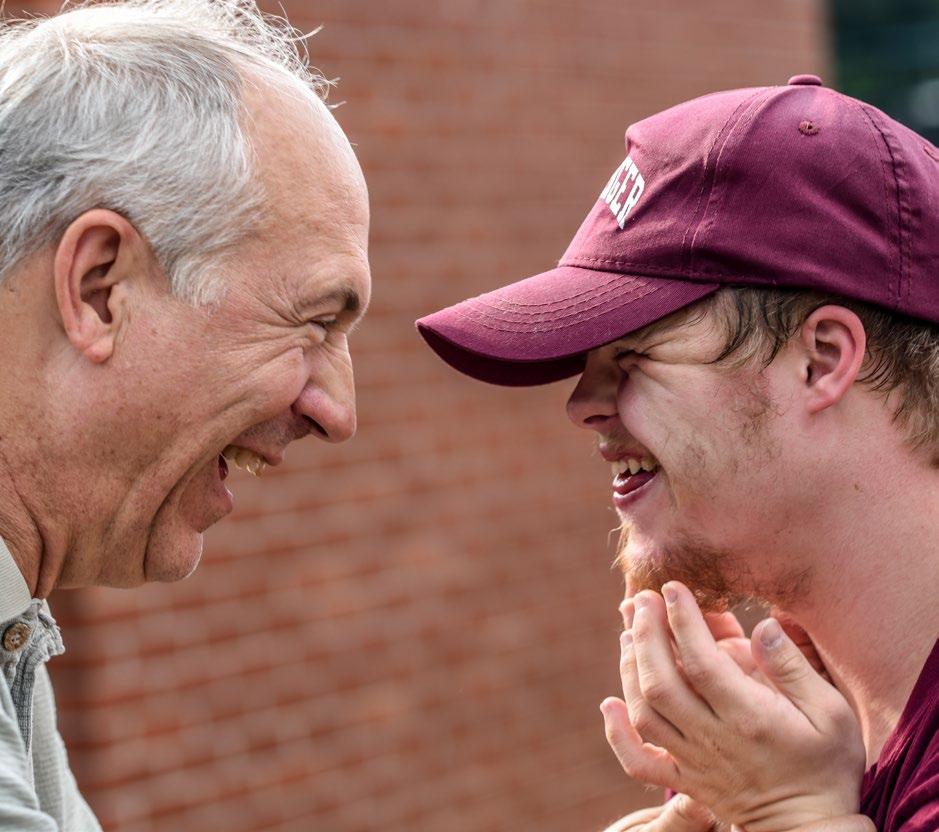
In the fall of 2019, CAN added to its services the Caregiver Help Desk , which provides free, confidential support to family caregivers across the country. Staffed by trained caregiving experts, this live support offers guidance through the website via an online chat function. The help desk resource is made possible through a partnership with Carallel , a provider of caregiver support solutions combining personalized expert guidance with digital tools.
CAN Corporate Partners
CAN’s major funding source for programming comes from its generous corporate partnerships. More than 40 preeminent pharmaceutical, bio-tech, and consumer product corporations are members of CAN’S Corporate Leadership Council , which has experienced deep growth since its inception in 2015. CLC membership giving categories range from the $15,000 Supporting Partner level to the $100,000 Sustaining Partner level.

Corporate partners must demonstrate a committee to:
• Ethical business practices
• Safe products and/or services
• Employee health and wellbeing
• Community service
Through their corporate sponsorship, companies such as Biogen, Eli Lilly, Johnson & Johnson, Pfizer, United Healthcare, and Home Instead are among those enabling CAN to provide resources and services free to the public in exchange for aligning with a cause that resonates with their employees and consumers, accessing experts in family caregiving, and staying apprised of policy issues facing this important segment of the population.
Page 7
Grassroots Volunteering
In 2019, CAN developed the initial concept for Community Care Corps (CCC), an initiative designed to encourage and build volunteer programs at the community level. Today, through a federally-funded grant program, CCC and its partner organizations (CAN, The Oasis Institute , USAging , and Altarum ) invest millions annually in innovative local models that provide nonmedical, yet critical volunteer assistance to family caregivers, older adults, and people with disabilities, helping them maintain independence in home-based or community-based settings.
Extensive Digital and Educational Offerings
In reaching more family caregivers where they are, CAN’s easily accessible resources reach millions each year. Its Family Caregiver Toolbox offers guidance on numerous caregiving situations and provides tailored information by specific conditions. Its monthly e-newsletter Take Care! offers key resources, caregiver stories, and advocacy updates through a national 26,000-subscriber distribution.
In 2021, CAN launched its #CaregiverAnd campaign to encourage family givers to not lose sight of who they are in the midst of managing the myriad of caregiving responsibilities. The campaign shifts the focus to the other roles, activities, and passions in the life of a caregiver.
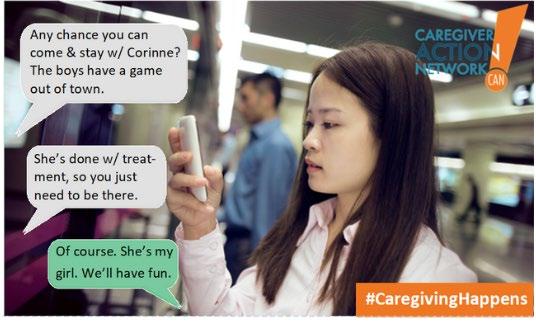
WATCH: #CaregiverAnd

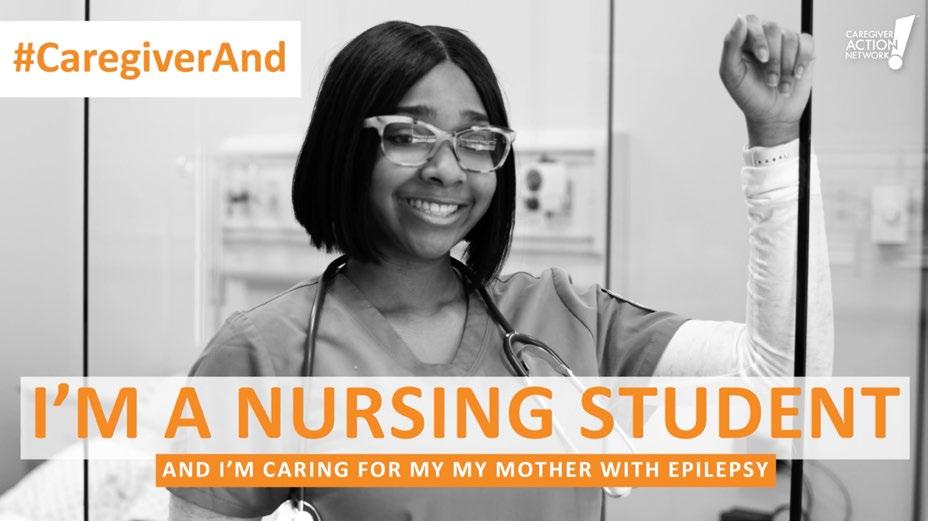
A key vehicle for CAN, its social media presence has steadily increased through greater visibility on Facebook through #CaregivingHappens , Twitter, Instagram, and LinkedIn. In 2022, CAN wrote, produced, and distributed on social media its own micro-videos underscoring the dayto-day challenges faced by caregivers.
CAN has a long history of well-attended inperson and online educational programs. The pandemic prompted a move away from on-site presentations to the increased use of webinars, which has greatly enhanced the organization’s reach nationally. Once held, webinars are then added to CAN’s expansive digital library. CAN also uses email marketing to reach influential constituents, including Department of Veterans Affairs caregiver coordinators, agencies on aging, patient advocacy groups, and CAN’s database of family caregivers.
Page 8
Caregiver Diversity, Equity, and Inclusion
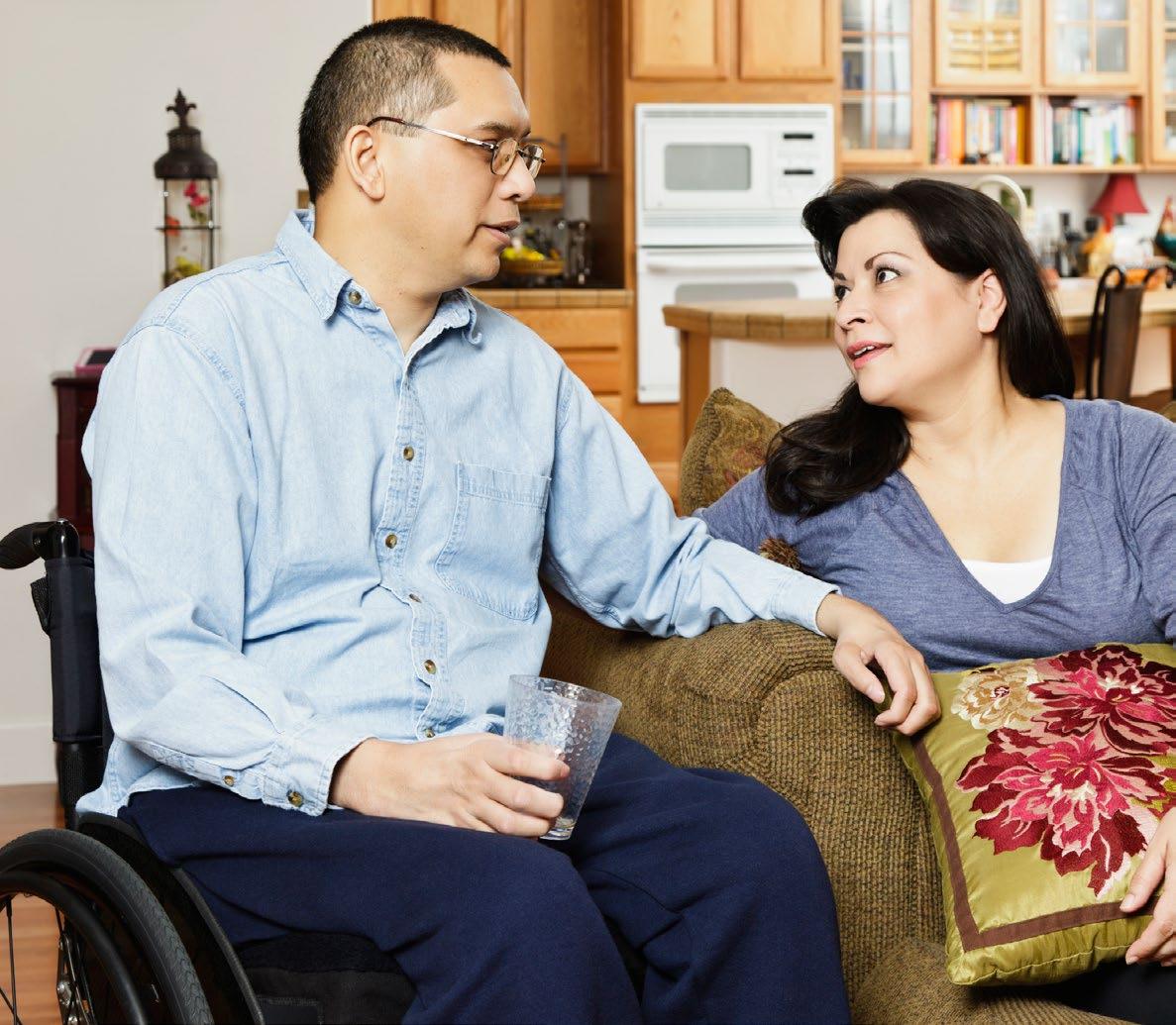
Family caregivers are too often treated as a homogenous group—white females in their late 40s raising children while caring for aging parents. However, data indicate that nearly 40% of family caregivers in the United States are caregivers of color. In preparing family members to become caregivers, the one-size-fits all approach to communications used by health systems today falls short of addressing cultural communication nuances across diverse populations.
In a newly launched initiative CAN is working with current family caregivers from diverse backgrounds to inform the development of culturally appropriate and relevant educational materials. As part of this effort, CAN is also creating an Outreach Coalition of national and community organizations that work directly with racially and ethnically diverse groups as well as LGBTQ+ communities, and immigrant groups.
This critical information will make caregiver education more accessible and effective while helping family caregivers feel more empowered and less isolated.
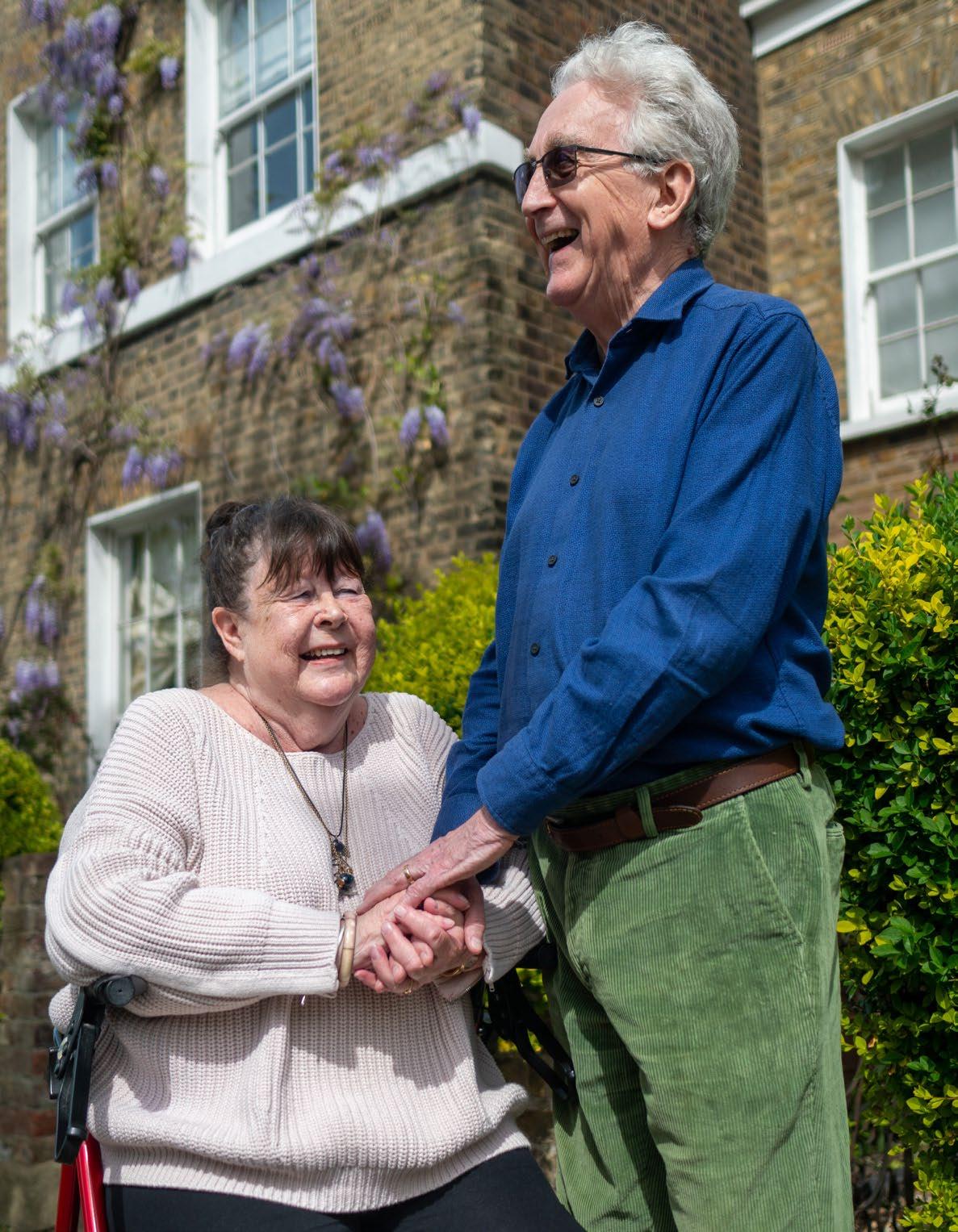
Page 9
CAN’s Next Chapter: Positioned for Mission Advancement
With a 30-year foundation of leadership in family caregiving, and heightened national attention to this critical health care issue, CAN is uniquely positioned for momentous growth. CLC sponsorships, which account for more than half of the organization’s $1.5 million revenue, is an area of great opportunity, as is continued diversification of revenue. With caregiving issues gaining increased awareness, the CLC can extend beyond its current core membership base to include the ever-growing group of family caregiver-industry stakeholders.
While revenues for the organization have tripled over the past decade, CAN operates in an entrepreneurial, mission-driven manner to ensure its ability to offer critical caregiver resources at no cost. Its talented and committed team makes up the majority of expense in this high-touch, servicedelivery model.
Staff operate out of a leased suite of offices located at 1150 Connecticut Ave, NW in Washington, DC. The team numbers nine, including the CEO; each team member is a passionate and enthusiastic champion of CAN’s mission (see organizational chart).
CAN has a national Board of Directors with 15 seats. This dedicated group meets four times annually and is committed to advancing CAN’s mission on behalf of the 90 million family caregivers across the country. Board members are engaged in planning and thinking about innovative ways to support and serve family caregivers, representing the organization across the country in the national dialogue about family caregiving.

Page 10
Position Description
Summary
Reporting to and working closely with the Board of Directors, the CEO provides visionary and strategic leadership in building on CAN’s tradition of providing outstanding, innovative, and high-impact resources and programs for the family caregiving community. The CEO is a passionate, articulate, authentic champion for family caregivers in a highly visible, highprofile external role. In addition to business planning and aligning strategic initiatives with the current needs of family caregivers, the CEO identifies future opportunities for advocacy, partnerships, and funding, and develops, directs, and carries out strategies that ensure the organization’s financial and programmatic sustainability, including broadening the community of corporate partners and funders.
As the face of the organization, the CEO serves as a brand ambassador and the voice of family caregivers, interfacing with business leaders, policy makers, media, and others vital to advancing an aspirational agenda. Internally, the CEO inspires, empowers and leads a team, fostering a work culture that values and appreciates the uniqueness of individuals, their capabilities, insights, ideas, and contributions.
Primary Responsibilities
Leadership
• Lead the organization and continually evolve its vision to ensure mission advancement in a fiscally responsible manner, addressing and adapting to the changing health care environment and family caregiver landscape.
• Plan, develop, and execute initiatives that meet the needs of family caregivers, setting ambitious yet realistic goals, budgets, timelines, and deliverables that ensure continued programmatic excellence and growth.
• Oversee the organization’s finances, ensuring strategic and sustainable financial management, reporting, compliance, and adherence to best practices in nonprofit management and fund development; and business proposals that rest on sound reasoning, data-driven analysis, and consideration of alternative courses of action.
• Ensure that all operational and programmatic areas – community initiatives, caregiver programming and education, corporate partnerships, fund development, multimedia communications, and advocacy—meet the highest standards, are continuously improving, and are in compliance with all regulatory and professional guidelines.
• Oversee a team of eight—leading, motivating, and supporting these individuals as they carry out the organization’s work with high integrity, accountability, creativity, thoughtful analysis, sound judgment, professionalism, and a customer/client service orientation. Create a workplace culture that ensures staff feel listened to and valued.
Page 11
External Relations and Fund Development
• As CAN’s lead spokesperson, serve as its “face” and “voice” on relevant matters, interfacing with all external constituents to build alliances and understanding.
• Be fluent in caregiving issues to shape advocacy efforts and be recognized with external audiences as a thought leader on caregiving topics.
• Cultivate, deepen, and steward positive, productive relationships with the Corporate Leadership Council, maintaining a portfolio of current and prospective members and relationships.
• Serve as primary relationship manager and lead advocate with legislators, government entities, appropriate public policy organizations, health care and other nonprofit organizations active in family caregiving and patient advocacy.
• Continually strengthen the organization’s brand and visibility, including multimedia/ digital communications and website, ensuring an accessible gateway to family caregiver information and resources.
Board Relations
• Develop and maintain a strong, collaborative, transparent relationship with the Board in strategic planning and performance measurement across financial, programmatic, and impact initiatives.
• Educate, inform, and engage board members in critical initiatives and proposals, serving as a key advisor in developing and furthering short- and long-range strategies and plans.
• Serve as ex-officio member of the Board and provide staff support for board meetings.
• Support the Board with development, implementation, and/or enforcement of the organization’s policies and procedures.
• Collaborate on the identification, recruitment, on-boarding, retention, and engagement of board members.
Key Competencies
• Bachelor’s degree; advanced degree preferred (e.g., nonprofit, business, public health, healthcare, public administration, or related field).
• Minimum 10 years’ experience leading organizations through growth with a strategic, data-driven, detail orientation, and a focus on deliverables.
• Professional or personal experience with nonprofit governance, including compliance, board development/management; knowledge of nonprofit operations, finance, fund development, and multimedia communications needed for national engagement.
• Experience, knowledge, and/or relationships within the policy-making and advocacy environment, preferably leading advocacy initiatives in the national political and public domains.
• Experienced in developing partnerships, affiliations, alliances, and other strategies to advance an organization’s strategic growth initiatives.
• Collaborative, hands-on leader with strong management skills and a demonstrated ability to establish and focus priorities, address challenges, and move effectively toward identifying solutions, keeping projects and tasks on track.
Page 12
• An inspirational, optimistic, visionary leader who promotes, recognizes, and rewards teamwork, collaboration, and innovation; demonstrating dedication in a way that inspires staff and engenders commitment to reaching organizational, team, and individual goals.
• Exceptional oral/written communications skills and the ability to serve as a professional and authentic spokesperson and a passionate champion of CAN’s mission and the needs of family caregivers.
Additional Characteristics and Abilities
• Displays positive attitude, energy, assertiveness, and earns the trust of all staff.
• Demonstrates integrity both personally and professionally; is respectful and respected by others.
• Superb interpersonal, communication, public speaking, and listening skills.
• A superior relationship manager, able to engage and coalesce stakeholders, and build alliances and partnerships across numerous constituencies.
• Politically adept, and able to influence policy makers and funders.
• Demonstrated proactive organizational skills and the ability to find positive solutions to challenges. Able to delegate and empower teams.
• Values and nurtures a diverse, inclusive, and empowered workforce.
• Able to quickly build and cultivate working relationships and networks of relationships to serve an organizational mission.
• Savvy in multimedia communications and in using the latest technology tools in management and presentations.
• Able to map out strategies and work collaboratively with a variety of nonprofit and business partners on significant initiatives.
• Decisive with clarity, transparency, and authority.
• Sense of humor.
Opportunities in Year One
• Review and assess current business and financial model, organizational structure, programs, and policies and procedures. Finalize FY 2024 budget.
• Manage organizational transition, ensuring appropriate supports are in place for employee engagement and retention; ensure that every CAN employee has access to CAN’s new health insurance benefit.
• Develop a performance management system that introduces greater accountability among team members, rewards performance against goals, and celebrates success.
• Cultivate and engage key stakeholders, solidifying at least two new CLC/Funder relationships by year-end 2023.
• Review and ensure CAN’s communications, web presence, and digital toolbox are current and able to support its strategic initiatives and growth goals.
• Support new board member recruitment, helping the Board bring on three new members by year-end 2023.
Page 13
Vision for Moving Forward
• Work with the Board to determine CAN’s strategic and funding priorities for FY 24-25, with goals and milestones, to optimize impact and best position the organization for the next five to ten years. Perform ongoing SWOT analyses, including a review of the competitive funder landscape.
• Foster a diverse, equitable, and inclusive culture in which CAN staff are empowered to do their best work on behalf of family caregivers.
• Establish an external leadership presence in the caregiving community and be visible and accessible to policy makers and government agencies working on behalf of caregivers; identify and maximize advocacy and speaking opportunities driven by strategic programming needs.
• Explore strategic relationships and partnerships with like-minded organizations working on behalf of caregivers; consider affiliations and mergers.
• Help strengthen board make-up, recruiting and engaging volunteer leaders as financial stewards and ambassadors of the organization.
This is a retained search of Exceptional Executive Search. For more information contact: info@eesrecruit.com .
EXECUTIVE SEARCH
Page 14
x
Eceptional














